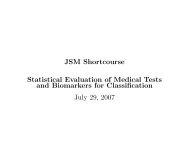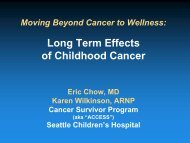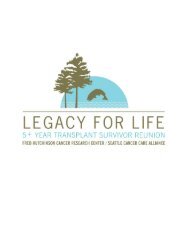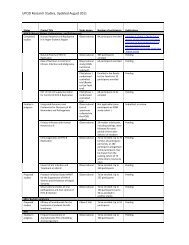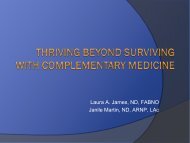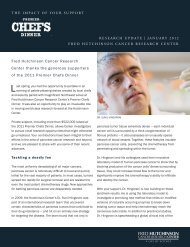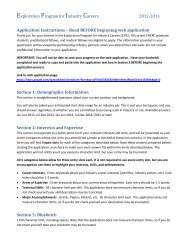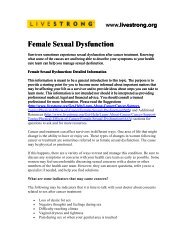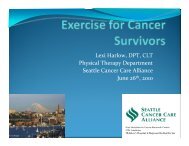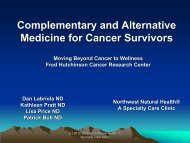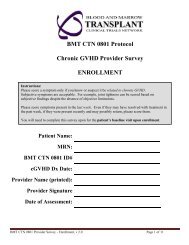Summer Undergraduate Research Program - Fred Hutchinson ...
Summer Undergraduate Research Program - Fred Hutchinson ...
Summer Undergraduate Research Program - Fred Hutchinson ...
You also want an ePaper? Increase the reach of your titles
YUMPU automatically turns print PDFs into web optimized ePapers that Google loves.
Extra Personal Statement #12<br />
While 'gutting' the remnants of a flooded home in New Orleans during the aftermath of<br />
Hurricane Katrina, I exposed the yellow agar of a small Petri dish to sample the spore-ridden<br />
air of a child's moldy bedroom. After an improvised collaboration at Louisiana State<br />
University, ninety plates and a light microscope were used to identify over twenty-five<br />
different species of mold in homes across the city–some of them pathogenic to humans. It was<br />
this occasion that helped me build upon my prior research experiences to establish an<br />
interminable curiosity in pathogens and how they inflict harm in humans.<br />
When I was an undergraduate studying Biology at Oregon State University, I began to develop a<br />
deep-seated interest in infectious disease and the mechanisms by which immunity evades or<br />
destroys the agent responsible for infection. In a liberal arts environment, my appreciation for<br />
host-pathogen interactions was gleaned from multiple faculty members with different biological<br />
specialties. In place of classes dealing exclusively with the fields of virology, bacteriology, or<br />
immunology, my highly integrated courses were taught by a close-knit department that harbored<br />
the value of independent learning. The result was a well-rounded approach that encouraged<br />
scholarship through self discovery. This methodology initially inspired me to delve further into<br />
scientific understanding. I often looked for ways to independently increase my breadth of<br />
knowledge in subspecialties as I gained a general understanding of them from in-class activities.<br />
It is this personal attribute which I believe most closely justifies my interest in pursuing a career<br />
in biomedical research.<br />
My first independent research experience was oriented in the field of developmental biology. I<br />
studied the inhibitory effects of an herbicide on the oocytes of Xenopus laevis, elucidating the<br />
targeted components of the signal transduction pathway leading to maturation. This 10-week<br />
experience was very rewarding in that it highlighted the importance of an interdisciplinary<br />
approach to laboratory investigation, combining the concepts of organismal development with<br />
procedures akin to cell biology and environmental toxicology. The project instilled patience,<br />
open-mindedness, and perseverance into my repertoire of scientific abilities. As an<br />
introduction to full-time laboratory work, the experience served as a sound foundation to<br />
support my subsequent research endeavors. Once I was exposed to microbiology and<br />
evolutionary biology as an upperclassman, I was moved to search for a post-baccalaureate<br />
program in the field of infectious diseases and immunology.<br />
As a recipient of the intramural <strong>Research</strong> Training Award at the National Institutes of Health in<br />
Bethesda, Maryland, I worked in the Laboratory of Immunoregulation headed by Dr. Steven<br />
Cooper, director of the NIAID. During my one year fellowship, my research project focused on<br />
the characterization of virus-specific CD8+ T cell responses in the context of chronic HIV<br />
infection. In particular, I studied cellular immune responses in a rare group of HIV-positive<br />
patients called long-term nonprogressors (LTNPs). In an effort to elucidate the mechanism<br />
responsible for the immune-mediated control of HIV replication exhibited by LTNPs, I helped<br />
develop and optimize a novel in vitro flow cytometric assay to measure cell-mediated<br />
cytotoxicity. I also carried out proliferation assays to further investigate the differential<br />
proliferative capacities of cells derived from LTNPs and patients with progressive disease. As a<br />
result, I have become proficient in tissue culture techniques, cell staining with fluorescentlyconjugated<br />
monoclonal antibodies, and analysis by polychromatic flow cytometry. The NIH<br />
fellowship was critical to my scientific development because I gained insight into the<br />
fundamentals of immunology in a hands-on environment designed to develop (and test) my<br />
144




